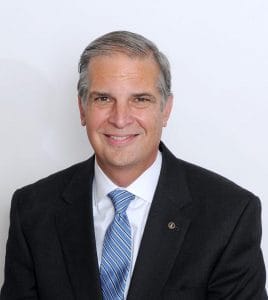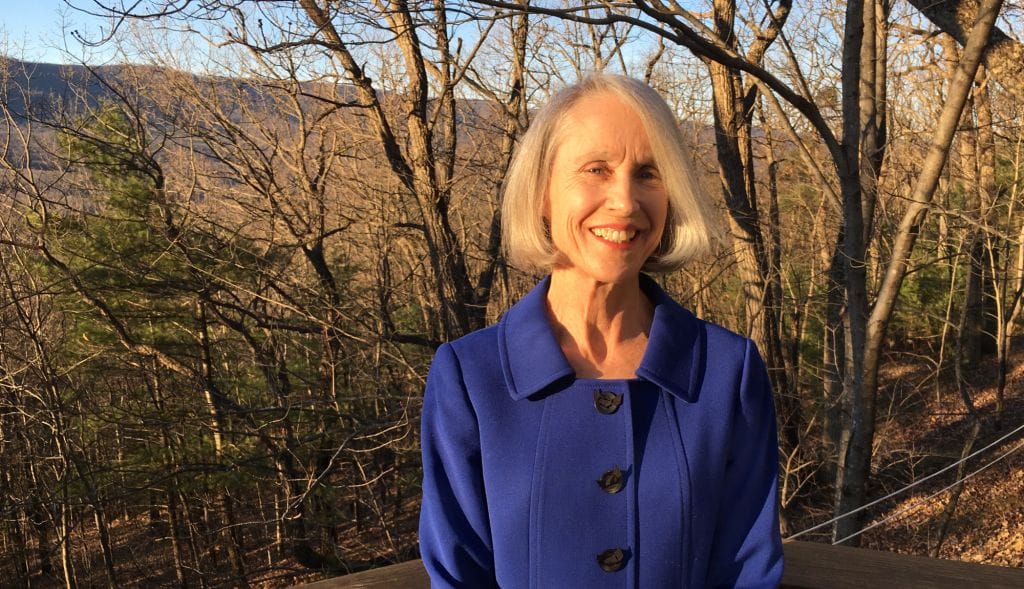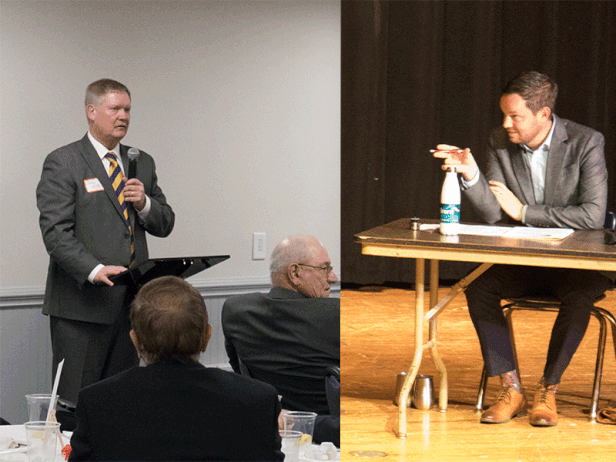By Bridget Manley and Ryan Alessi
The special session the governor called to enact gun control measures in Virginia last week lasted just two hours — but its abrupt end hasn’t stopped the debate over gun violence policies. Instead, the venue has shifted from the state House and Senate floors to the Virginia State Crime Commission and to the campaign trail as legislators and their challengers differ over the potential path forward.
“We have some interesting and pressing public issues that we are dealing with,” said state Sen. Mark Obenshain, R-Harrisonburg. “Twelve people died in this mass shooting in Virginia Beach…These mass killings were what motivated the governor to call for this special session. We all agreed that this is a compelling and pressing public policy crisis that we absolutely need to attend to.”

Sen. Mark Obenshain
Obenshain, who is the chairman of the bipartisan crime commission, said the group will try to better understand the climate surrounding gun-related measures and recommend potential legislation that the General Assembly can take up next year. When Republicans voted to adjourn the special session, they asked the crime commission to provide a report to the General Assembly in November — after the Nov. 5 elections in which all 40 state Senate and 100 state House seats are on the ballot.
The crime commission will hold hearings, including discussions of specific proposals, during meetings on Aug. 19 and 20. The session — which includes members of both parties but is headed up by Republicans because the party controls both legislative chambers — will have include public comment, presentations and discussion of policy options and recommendations that will “make a real difference in keeping Virginians safe,” Obenshain said.
What that might look like, though, is unclear. In part, that’s because separating politics from policy could be tricky if the finger-pointing over last week’s brief special session is any indication. Then there’s the fact it will occur against the backdrop of an election.

April Moore
April Moore, the Democratic candidate challenging Obenshain in November for the 26th District that covers Harrisonburg, said she was “horrified and angry” that the Republican majorities adjourned the special session, and hopes voters feel that way too.
“Gun violence is a scourge on our state and our country,” Moore said. “We shouldn’t have to endure one mass shooting after another… Governor [Ralph] Northam’s attempt was laudable.”
But Obenshain said Northam is to blame for the session’s failure to produce meaningful debate.
“I would turn that right around and say the Democrats seem to be more about political theater and window dressing than about real solutions,” Obenshain said. “The governor has expressly admitted that the pieces of legislation that he proposed would have done absolutely nothing to prevent what happened in Virginia Beach, and I don’t really think that’s a meaningful or good faith response.”
He contrasted Northam’s approach with that of another Democrat, then-Gov. Tim Kaine, in the wake of the Virginia Tech massing shooting in 2007.
Kaine called a blue-ribbon task force to evaluate and recommend policy changes. Despite putting forth dozens of potential changes, none became law, as the investigative news organization ProPublica pointed out in its 2013 review of state legislative responses to mass shootings.

Del. Tony Wilt, R-Broadway, and Democratic challenger Brent Finnegan
Point of debate in the 26th House District race?
Del. Tony Wilt, R-Broadway, said he, like Obenshain, believed channeling the debate through the crime commission is the most prudent way forward.
“We need to make decisions based on the facts, not by hyperbole,” he said.
And Wilt said he is “fully confident” that the commission will come up with recommendations and called it “likely” the General Assembly will act on them. Wilt said he’ll make his decisions on how to vote on any of them based on relevant data and context.
“One thing I’ve seen with the General Assembly, especially with lawyers … is that at the end of the day, they put the law above party politics,” Wilt said. “That’s been my experience. They won’t allow partisan politics to come into play. It will be based on the facts.”
His Democratic opponent in the 26th House race, Brent Finnegan, said he believes Republicans’ actions last week contradict that.
The likelihood the General Assembly to act “depends entirely on the outcome of the election on Nov. 5,” Finnegan said. “That means it’s up to the voters to decide. If [the Republicans] can’t get it done, then the voters need to elect someone who will.”
Finnegan said he wants to see the General Assembly start with three bills:
- requiring universal background checks on anyone who seeks to buy a firearm, including at gun shows;
- allowing local governments the option of prohibiting guns in public buildings or meetings;
- and passing laws requiring “best practices” for safe gun storage to reduce the opportunity for accidental shootings, especially by children.
Finnegan pointed to a Quinnipiac University poll from last month — in the wake of the Virginia Beach shooting — that showed 91 percent of Virginia voters said they supported requiring background checks for all gun buyers. That group included 88 percent of respondents who identified as Republicans, according to the poll.
Finnegan, who serves on the Harrisonburg planning commission, also said he sometimes worries about the vulnerability of those in that room, which is one reason why he wants the General Assembly to grant local governments the power to ban weapons from public meetings.
“Sometimes the discussions get heated,” Finnegan said. “I think what if someone has a firearm? There are buttons on the dais to make an emergency call on the police. But it’s ridiculous we have those buttons, and we don’t have the authority to say no firearms in the building.”
Wilt told The Citizen last month he isn’t opposed, in concept, to universal background checks, but wants to hear specifics of any proposal because he’s also mindful of people’s Second Amendment rights.
“We’re trying to protect the citizenry, yet we can’t hamstring the citizenry either,” he said. “That’s the core of a lot of these things.”
Both Wilt and Finnegan talked with The Citizen Monday — the same day Harrisonburg police arrested two men for a shooting Sunday evening that sent two people to the hospital.
“Any situation like that it’s a terrible situation. It’s a tragedy that those type of things happen. But we have laws that say: Don’t do that,” Wilt said.
Finnegan said the shooting is another reminder that far too many people are injured or die from gunshots in Virginia and the legislature “punted” last week by failing to even debate some of the more than decade-old proposals after the 2007 Virginia Tech shooting.
“This is an abdication of their responsibilities as legislators,” Finnegan said. “I don’t buy that we need to a study about what should be done.”
The Virginia Crime Commission did invited lawmakers to submit proposals for the commission to review and explore. Wilt said he thought about several but ultimately didn’t put in any requests.
Finnegan, though, said he considers Wilt’s legislative record on gun policies to be more “extreme” than his rhetoric. Finnegan cited as examples two bills — one Wilt sponsored in 2015 and one Wilt successfully pushed through in 2017 that then-Gov. Terry McAuliffe vetoed.
The legislation in 2017 would have eliminated the state’s prohibition of firearms in emergency shelters. At the time, McAuliffe’s veto message said doing so could shake the confidence and risk safety of people seeking shelter during an already stressful time of an emergency and “would endanger vulnerable families (including young children), not to mention the staff and volunteers.”
Wilt said private shelter operators, such as the Red Cross, could still prohibit guns and they still wouldn’t be allowed in schools, but it would eliminate the blanket ban.
“For those that have been forced out of their home due to an emergency and wish to retain their rights and ability to defend themselves, they are forced to make an impossible choice when the governor or other official decides to implement a ban in all facilities,” he said.
As for House Bill 2027 from 2015, it would have allowed people to carry a firearm into airport terminals, which Wilt said would have brought Virginia “in line with federal law and the law in 43 other states that allow some form of possession in the unsecured area of an airport.” He noted that it’s still legal to carry a firearm in checked baggage.
But Finnegan said those measures were unnecessary and potentially jeopardized Virginians’ safety.
“Who’s asking for this stuff? Where is that even coming from?” Finnegan said. “These are bills that I believe indicate Del. Wilt is an outlier in this debate, and he is far to the extreme of making our community less safe and letting people carry guns whenever and wherever they want, even if that puts the safety of the community at risk.”
Wilt, though, said he is proud of his record on the Second Amendment and “standing up for the rights of law-abiding gun owners.” And, he added, he doesn’t believe that passing new laws is always the way to keep people safe from those who break existing laws.
Residual effects from the special session
Supporters of gun rights and advocates for stronger gun controls converged on Richmond last Tuesday, showing the passion on both sides of the issue. Finding common ground amid such debates can be challenging.
But one of the seven bills Northam suggested — the Extreme Risk (“Red Flag”) Protection Order measure — has gained traction in more than 15 states and has drawn the interest of President Donald Trump’s administration. Under such measures, authorities could confiscate firearms from people courts view as dangerous enough that a restraining order is necessary.
Moore, the Democratic challenger in the 26th Senate District, said she holds Obenshain partially responsible for failing to allow discussion at least on that measure this year, considering Obenshain chairs the Senate Committee on Courts of Justice.
“His Republican allies on his committee bottled up all of these bills. Not a single one of them got out onto that state senate floor for discussion and a vote,” she said. “That’s terrible. He should at least let his fellow senators to debate and take some action.”
The outcome also drew criticism from Andy Parker, the father of Alison Parker, a JMU graduate and television reporter who was shot and killed on live television in Southwest Virginia in 2015. Now a gun control advocate, Andy Parker called the abrupt end of the special session a “disgraceful act of cowardice on the part of the Republicans in the Virginia General Assembly.”
Obenshain said he does see an opportunity for lawmakers to act.
“I think that there are important legislative changes that we can make and should make,” Obenshain said. “I personally don’t believe in undermining the Second Amendment rights of law-abiding citizens. I don’t believe that’s going to make us safer. I do believe that we need to do a better job of keeping guns out of the hands of criminals, keeping guns out of the hands of the mentally ill who pose dangers to themselves or others, and I think there are important steps that we can take in those directions.”
Parker said steps should have been taken, and have been taken in other states, that would help curb gun violence without taking away the rights of gun owners.
“Universal background checks, I mean, how hard is that? … Limiting magazine capacity,” Parker said. “They say that ‘nothing on the books today would have prevented the slaughter in Virginia Beach.’ Well, you know what? This guy had high capacity magazines. You can limit those. Someone said ‘whatever we do, whatever we can enact, it’s not going to solve it altogether. But you can save lives.’”
Obenshain, however, says he does not believe there is a simple solution to curbing gun violence in the state.
“I do not believe there is a panacea; I do not believe there is a simple solution to this issue,” Obenshain said. “I think that it is highly complicated, I think anybody who suggests that they have a simple solution is delusional.”
Journalism is changing, and that’s why The Citizen is here. We’re independent. We’re local. We pay our contributors, and the money you give goes directly to the reporting. No overhead. No printing costs. Just facts, stories and context. Thanks for your support.













